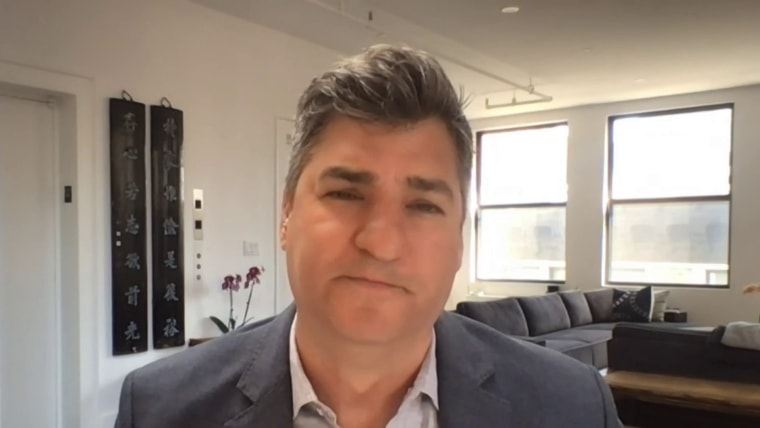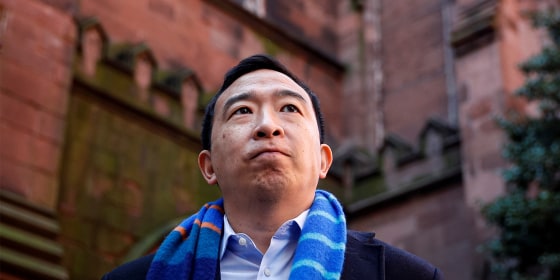Former Democratic presidential candidate Andrew Yang on Tuesday announced his new effort to help Americans break free from a stagnant two-party “duopoly”: a new political party he calls the Forward Party.
The name of Yang’s third party is characteristically sunny. But unfortunately it’s not actually clear where this party is going or what problem it would solve.
In his announcement video, Yang decried the scourge of polarization, which he described as the product of incentives in our media and political systems — especially gerrymandering and the way primaries encourage politicians to cater to their base over voters in the center — and suggested a new party is needed to disrupt a competition-stifling political order. He also cited unsourced polling statistics about how most Americans are dissatisfied with Congress and want a third party.
Yang’s rise as an American political celebrity has been swift and startling.
Yang is right that there is widespread disillusionment with Congress and our major political institutions. Trust in them has been declining for many years. But his diagnosis of the problems that ail us is shallow: Our polarization crisis is driven by far more than primary-induced partisanship and uncompetitive districts. And there is little reason to believe his proposed solution — a third party with no clear policy vision other than universal basic income and a grab bag of mostly incremental democracy reforms — has a market or could inspire the kind of mass movement a third party would need to become viable.
Yang’s rise as an American political celebrity has been swift and startling. A former entrepreneur and political neophyte, he ran a surprisingly popular campaign in 2019 during the Democratic presidential primary race. He found success by leveraging his outsider status and pushing for a universal basic income: $1,000 every month to every American, no strings attached. That kicked off a substantial policy debate and earned him goodwill; Yang was never a candidate with real prospects of winning a state, but his single-minded focus on UBI was respected by the electorate and earned him a cult following online.
But when he parlayed that rise in popularity into a New York mayoral run earlier this year, Yang looked less impressive. While he performed shockingly well in the polls for a time, as he came under scrutiny, he also revealed that he had no coherent worldview. The Atlantic’s Annie Lowrey summed up his oddball run on a New Republic podcast thusly:
He’s pushing all this new spending and unconditional spending, but then it has a very corporatist streak, and he’s basically said that he wants to cut taxes, has all of these, like, pro-business, anti-regulatory policies, and it’s an unusual and pretty unpopular brand of politics that you kind of only see coming from, like, Silicon Valley. I keep on going back and forth, being like, “Is he really far to the left or really, really stuck in the center?” And I think the answer is “Yes.” Like, I don’t know that you can actually square that circle.
The ambiguity of Yang's candidacy and his lack of political connections to key constituencies ultimately sank his bid. And Yang’s new political project seems to fit more into the kind of confused ideological sensibility and inattention to the political pulse we saw during that race.
First, Yang’s diagnosis of the polarization problem is simplistic. While he spotlights primaries and uncompetitive districts, he makes no mention of the fact that political scientists and journalists have consistently documented how polarization in Washington is asymmetrical. Specifically, the Republican Party has become radicalized, more resistant to good-faith governing and defected unilaterally or disproportionately from majoritarian governance through practices such as abuse of the Senate filibuster and Supreme Court nomination norms. This is not an issue, as Yang suggested, of both sides simply being forced to dislike each other because of how we nominate politicians, but the result of the emergence of a radical right-wing movement and party hostile to governance.

Yang also fell prey to a common analytical error about the nature of polarization when he pointed out in his video that more people identify as independents than Democrats or Republicans — and suggested that’s a sign that there’s hunger for an alternative party. The problem with that line of thinking is that the overwhelming majority of independents lean consistently toward one party, and that “true independents” hover somewhere around 10 percent of the electorate. Even among that set, there is little sign that they’re ready to flee the two-party system. Consider that in 2016, a race between the two most unpopular major party candidates for president in the modern political era, resulted in just 6 percent of voters casting ballots for long-established third parties.
Yang also seems uninterested in engaging with the broader ideological clashes that underpin the divide between Democrats and Republicans today. The two parties might be incentivized to behave poorly by certain electoral cues, but they're also locked in existential battles over the nature of our republic, with substantive disagreements on how democratic the country should be, how multicultural it should be, and what rich people and the government owe to each citizen.
Yang’s Forward Party doesn’t offer any serious reckoning with these major questions about the American social contract or the questions that have red America and blue America at loggerheads. In fact, he doesn’t seem to reckon with very many ideas at all. In his top-line bullet points about his party’s platform, Yang listed:
- Open primaries and ranked-choice voting
- Universal basic income
- Human-centered economy
- Fact-based governance
- Modern and effective government
- Grace and tolerance
Aside from open primaries and UBI, these are meaningless buzzwords. The intention is to sound non-ideological and solutions-oriented, but the reality is that it suggests Yang has no discernible theory of how society works and what must be done to change it.
The new Forward Party website doesn’t offer much more light. Yang’s vision remains strikingly vague, and most the additional policies listed are experimental but distinctly small-scale democracy reform goals such as limiting lobbying and convening “civic juries” to influence policymakers. Little of what Yang proposes sounds unreasonable, but little of it seems in any way commensurate with the crises facing our nation, from a warming climate to white nationalist politics to skyrocketing inequality.
And it’s noteworthy that a party platform meant to disrupt our political system and make it more democratic has nothing to say about the anti-majoritarian features of our democracy, including the filibuster and the Electoral College. Many of the reforms Yang proposes would be unremarkable for a Democratic candidate to embrace in a local or congressional race.
Ultimately if Yang has a few causes that he wants to focus on — let’s say UBI and democracy reform — history suggests he’d be better off trying to create a movement within the Democratic Party than going it alone. A third-party candidate has never been elected president, and third parties tend to fare poorly at the state and local levels in this era as well. There are structural reasons for this, including our first-past-the-post and nonrepresentational system, the extreme administrative obstacles to ballot access for third parties, and the reality that many American voters view third parties as spoilers. But movements such as the tea party and the Democratic Socialists of America and anti-establishment candidates Donald Trump and Bernie Sanders have shown that it’s possible to disrupt the party system from within far more easily than it is from the outside.
The size of Yang's online following and his embrace of UBI, which historically has had appeal across the ideological spectrum, means we can't rule out the possibility that the Forward Party could rack up a non-trivial number of supporters. But it's safe to predict that most voters will pick up on the fact that Yang is offering no serious path out of our political predicaments.
Yang deserves credit for pushing a serious conversation about UBI into the mainstream in 2020. He should think more carefully about who is being served by a party that nobody seems to be asking for.

